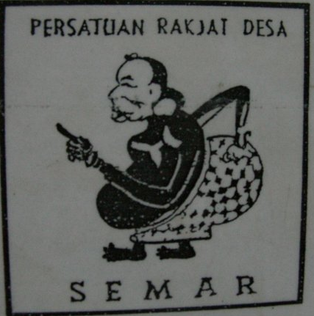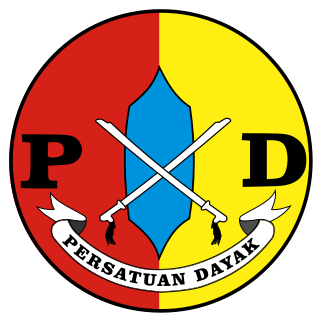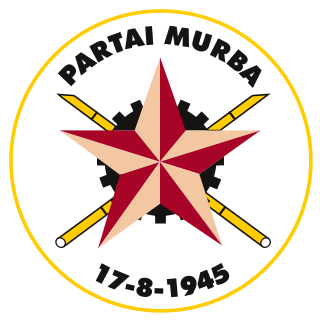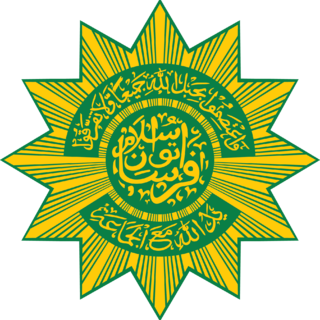
The United Development Party is an Islam-based political party in Indonesia.

The National Awakening Party, frequently abbreviated to PKB, is an Islam-based political party in Indonesia. It is also the party of the former Vice President of Indonesia, Ma'ruf Amin, who was elected to its Shura Council.

Nahdlatul Ulama is an Islamic organization in Indonesia. Its membership numbered over 90 million in 2021, making it the largest Islamic organization in the world. NU is also a charitable body funding schools and hospitals as well as organizing communities to help alleviate poverty.
There exist a number of perspectives on the relationship of Islam and democracy among Islamic political theorists, the general Muslim public, and Western authors.

Nurcholish Madjid, in Indonesia affectionately known as Cak Nur, was a prominent Indonesian Muslim intellectual. Early in his academic career, Nurcholish was a leader in various student organizations. He soon became well known as a proponent for modernization within Islam. Throughout his career he continued to argue that for Islam to be victorious in the global struggle of ideas, it needs to embrace the concepts of tolerance, democracy and pluralism.

Guided Democracy, also called the Old Order, was the political system in place in Indonesia from 1959 until the New Order began in 1966. This period followed the dissolution of the liberal democracy period in Indonesia by President Sukarno, who centralized control in the name of political stability. He claimed to have based the system based on the traditional village system of discussion and consensus, which occurred under the guidance of village elders. On the national level, however, this meant centralized rule under Sukarno: martial law, a massive reduction in civil liberties and democratic norms, and the Indonesian National Armed Forces and Communist Party of Indonesia acting as major power blocs.

The Council of Indonesian Muslim Associations Party, better known as the Masyumi Party, was a major Islamic political party in Indonesia during the Liberal Democracy Era in Indonesia. It was banned in 1960 by President Sukarno for supporting the PRRI rebellion.

The Acoma Party was a communist party in Indonesia. It evolved out of the Young Communist Force. Acoma was converted into Partai Acoma on 8 August 1952. Acoma/Partai Acoma was led by Ibnu Parna.

The Labour Party was a political party in Indonesia. It was formed on 25 December 1949 by a group of former Labour Party of Indonesia (PBI) members, who had disagreed with the merger of PBI into the Communist Party of Indonesia.
Party of the People of Free Indonesia was a political party in Indonesia. The party was based amongst the Sundanese population in West Java. In the 1955 parliamentary election, PRIM got 72,523 votes. One parliamentarian was elected from the party. After the election the party joined the Fraction of Upholders of the Proclamation, a heterogenous parliamentary group with ten MPs.

The Village People's Union was a political party in Indonesia. The party was based amongst the Sundanese population in West Java. In the 1955 parliamentary election, PRD got 77,919 votes. One parliamentarian was elected from the party. After the election the party joined the Fraction of Upholders of the Proclamation, a heterogenous parliamentary group with ten MPs.

The Islamic Tharikah Unity Party was an Islamic political party in Indonesia. In the 1955 parliamentary election, PPTI got 85,131 votes. One parliamentarian was elected from the party.
The Indonesian Marhaen People's Union, generally known by its acronym Permai, was a social movement in Indonesia, functioning both as a political party and an Abangan mystical association. The organisation was founded on 17 December 1945. Permai was led and founded by Mei Kartawinata in Cimerta, Pasirkareumbi, Subang, Subang Regency with two friends, M. Rasyid and Sumitra. At its peak on 17 December 1945, It was declared as a political party with J.B. Assa, Iwa Kusumasumantri, Izaak Riwoe Lobo, and S. Karsono Werdojo.

The Dayak Unity Party was a political party in Indonesia. Formed to represent 'primordial' interests of the Dayak people, the party was one few political parties in Indonesia at the time which was formed along ethnic lines. Oevaang Oeray, the first governor of West Kalimantan and one of the founders of the PPD, was a prominent leader of the party.

Murba Party was a 'national communist' political party in Indonesia. The party was founded by Tan Malaka, Chairul Saleh, Sukarni and Adam Malik in 1948. The history of the party was largely intertwined with that of the powerful Communist Party of Indonesia (PKI). Initially relations between PKI and the Murba Party were fluid, but gradually the two parties developed into each other's arch-enemies. The Murba Party continued to exist under the New Order, but was merged into the Indonesian Democratic Party in 1973.

Prijono was an Indonesian politician and academic. Prijono was a leading figure of the Murba Party and the Indonesian Peace Committee. Prijono served as Minister of Education and Culture between 1957 and 1966. He was one of the intellectual ideologues who surrounded President Sukarno.

Persatuan Islam is an Islamic organization in Indonesia founded on 12 September 1923 in Bandung by a group of Muslims who are interested in education and religious activities led by Haji Zamzam and Haji Muhammad Yunus.
Persatuan Muslim Indonesia, also abbreviated as PERMI, was a political party espoused Islamic-nationalism based in Padang Panjang, founded in 1930. The party was dissolved due to the crackdown by the Dutch East Indies colonial government in 1937. PERMI is regarded as a political party active against the colonial repression by the Dutch. Unlike other political parties, PERMI was unique in its embracing of both political Islam and nationalism and placed them two in a parallel position.

Islam Yes, Islamic Party No was a slogan coined by Indonesian Muslim scholar Nurcholish Madjid in his speech at Taman Ismail Marzuki (TIM) in Jakarta, in 1970. The slogan soon became a catchphrase in Indonesia that helped fight the notion that voting against Islamic parties was sinful for Muslims.

Mohammad Syafaat Mintaredja, was an Indonesian politician and government official, who served as the 18th Minister of Social Affairs, from 1971 until 1978. A member and leader of the United Development Party, he served as the party's first chairman, from 1973 until 1978.















